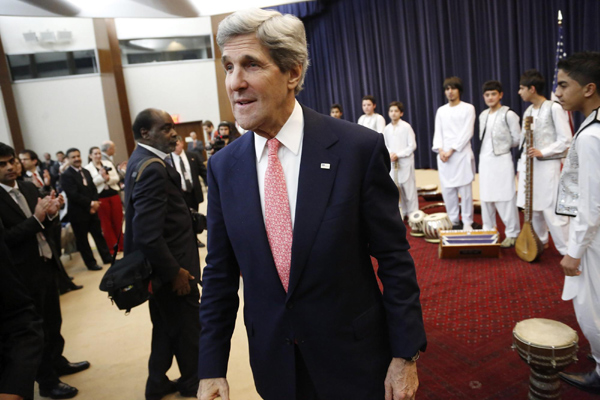Kerry urged to spell positive change on Diaoyu
Updated: 2013-02-05 09:12
(Xinhua)
|
||||||||
DENVER - As new US Secretary of State John Kerry started his first week of foreign policy objectives, Chinese officials were optimistic a change in Washington will spell a positive change toward resolving the Diaoyu Islands issue.
"We hope that (Kerry) will be more moderate on the (Diaoyu) issue," said Major-General Zhu Chenghu, Dean of the Defense Affairs Institute for China's National Defense University of the People's Liberation Army.
 |
|
US Secretary of State John Kerry departs after greeting members of the Young Afghan Traditional Ensemble before a performance at the State Department in Washington, Feb 4, 2013. [Photo/Agencies] |
Kerry, a seasoned, political heavyweight, former Massachusetts senator and 2004 presidential candidate, represents an opportunity to redirect Washington's course, Gen. Zhu told Xinhua.
Gen. Zhu flew to Atlanta's Emory University on Tuesday, concluding a two-city US university tour over seven days, to address audiences of scholars, businessmen, students and media on the state of China' s foreign policy and the Diaoyu issue.
As Kerry was sworn in Friday, replacing Hillary Clinton as America's 68th Secretary of State, Gen. Zhu was concluding talks at the University of Denver' s Josef Korbel School of International Studies, where Dean Christopher R. Hill reiterated US desires to see the Diaoyu conflict resolved peacefully.
"Traditionally in these maritime disputes it's advisable to wait until people's tempers cool," said Hill, who served as US Ambassador to South Korea, Iraq, Poland and Macedonia.
"Nationalism in both China and Japan has developed to a peak," cautioned Gen. Zhu.
Outgoing Secretary Clinton, while garnering considerable praise from the US media for her four-year tenure, raised eyebrows across the Pacific two weeks ago by saying America opposed "any unilateral actions that would seek to undermine Japanese administration" of the Diaoyou Islands, a remark Japan jumped on as vindication of its claim to the islands.
Gen. Zhu said the US government is sending the wrong signals to Japan.
Japan "bought" the archipelago in September 2012 from a Japanese family to solidify its claim, a move that triggered a rebuke from China.
"They had no right to sell something that didn't belong to them," said retired 92-year-old John Yee, an American historian and member of the Flying Tigers in WWII. "It was purely political."
Yee, who immigrated to America after the war, agrees with China's historic claim to the islands.
Newly elected Japanese Prime Minister Shinzo Abe told Japanese Coast Guard members in Okinawa that Japan would defend the disputed islands at all costs, Japan's Kyodo news agency said Saturday.
"Both sides need to turn down the heat," said Hill, who was President Barack Obama' s Assistant Secretary of State for East Asian and Pacific Affairs in 2009-2010.
Gen. Zhu noted, "America has the responsibility not to escalate tensions there," and said he is concerned as Japan increases tension.
Related readings:
John Kerry starts first day as US secretary of state
John Kerry reaffirms commitment to Mideast peace
John Kerry to visit Russia soon: Lavrov

 Li Na on Time cover, makes influential 100 list
Li Na on Time cover, makes influential 100 list
 FBI releases photos of 2 Boston bombings suspects
FBI releases photos of 2 Boston bombings suspects
 World's wackiest hairstyles
World's wackiest hairstyles
 Sandstorms strike Northwest China
Sandstorms strike Northwest China
 Never-seen photos of Madonna on display
Never-seen photos of Madonna on display
 H7N9 outbreak linked to waterfowl migration
H7N9 outbreak linked to waterfowl migration
 Dozens feared dead in Texas plant blast
Dozens feared dead in Texas plant blast
 Venezuelan court rules out manual votes counting
Venezuelan court rules out manual votes counting
Most Viewed
Editor's Picks

|

|

|

|

|

|
Today's Top News
Live report: 7.0-magnitude quake hits Sichuan, heavy casualties feared
Boston suspect cornered on boat
Cross-talk artist helps to spread the word
'Green' awareness levels drop in Beijing
Palace Museum spruces up
First couple on Time's list of most influential
H7N9 flu transmission studied
Trading channels 'need to broaden'
US Weekly

|

|







